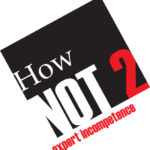I have just come away from another workshop, with another group of clever and hard working project people, in another “fast pace” global firm. Wherever I go the simple message seems to be the same, think slow at the start to move fast later. Despite Aesop and countless other story-tellers before and since, we seem increasingly immune to this mantra.
Of course, because I believe this to be the case I may just be reinforcing my own biases as it does appear to be freakishly common. I’d be interested to hear your thoughts to explore exceptions to this apparent rule.
The thing is, we appear to be adhering to one or both of 2 things:
- We love the excitement and energy of the early beginnings, the courting and honeymoon are after all the more viscerally stimulating parts of the marriage – right?
- We prefer to dodge the “inconvenient truths” that abound in the formative days of a project, like, why are we doing it? How big are the benefits? How hairy the risks? Do we have any idea what’s really involved? Do we have a time-machine and endless cash / resources?
To some, sadly often those “in charge”, these are annoying details to be combatted by people “lower down” who frequently lack the authority and influence to do much about them.
Naturally I am not completely refuting the requirement for raw ambition, nor am I suggesting we should paralyse innovation with analysis. What I do think would be helpful though is to adjust the timing of the difficult discussions that inevitably arise when we take on something new in complex and increasingly diverse organisations.
Let’s have the conflict, but let’s have it at the start. Simply dodging the inconvenient truths early on means they manifest later in proceedings when money has already been spent, expectations set, reputations require protecting and the ability and appetite to creatively problem solve are waning.
There are myriad tools to help project managers light the fuse of debate early on whether it be to question the validity of the business case or lay out the true complexity of the work to be done. These have existed for years.
What I think helps is a better understanding of the nature of “conflict” and a way of constructively dealing with it. To this end I have found the Thomas-Kilmann “conflict mode instrument” useful to help people get their heads around 3 key things:
- Well-managed conflict is good, in fact necessary in innovation
- There are different ways of dealing with it to harness the optimum outcome
- We all have different preferences for how we deal with conflict
To this end I would like to point to this great talk on the benefits of conflict and frustration for innovation by Tim Harford.
I have just come away from another workshop, with another group of clever and hard working project people, in another “fast pace” global firm. Wherever I go the simple message seems to be the same, think slow at the start to move fast later. Despite Aesop and countless other story-tellers before and since, we seem increasingly immune to this mantra.
Of course, because I believe this to be the case I may just be reinforcing my own biases as it does appear to be freakishly common. I’d be interested to hear your thoughts to explore exceptions to this apparent rule.
The thing is, we appear to be adhering to one or both of 2 things:
- We love the excitement and energy of the early beginnings, the courting and honeymoon are after all the more viscerally stimulating parts of the marriage – right?
- We prefer to dodge the “inconvenient truths” that abound in the formative days of a project, like, why are we doing it? How big are the benefits? How hairy the risks? Do we have any idea what’s really involved? Do we have a time-machine and endless cash / resources?
To some, sadly often those “in charge”, these are annoying details to be combatted by people “lower down” who frequently lack the authority and influence to do much about them.
Naturally I am not completely refuting the requirement for raw ambition, nor am I suggesting we should paralyse innovation with analysis. What I do think would be helpful though is to adjust the timing of the difficult discussions that inevitably arise when we take on something new in complex and increasingly diverse organisations.
Let’s have the conflict, but let’s have it at the start. Simply dodging the inconvenient truths early on means they manifest later in proceedings when money has already been spent, expectations set, reputations require protecting and the ability and appetite to creatively problem solve are waning.
There are myriad tools to help project managers light the fuse of debate early on whether it be to question the validity of the business case or lay out the true complexity of the work to be done. These have existed for years.
What I think helps is a better understanding of the nature of “conflict” and a way of constructively dealing with it. To this end I have found the Thomas-Kilmann “conflict mode instrument” useful to help people get their heads around 3 key things:
- Well-managed conflict is good, in fact necessary in innovation
- There are different ways of dealing with it to harness the optimum outcome
- We all have different preferences for how we deal with conflict
To this end I would like to point to this great talk on the benefits of conflict and frustration for innovation by Tim Harford.






One Response
Really outstanding post,
Really outstanding post, Thank you for talking about These details.Excellently released material, if only all weblog authors offered the same level of fabric as you, the internet would be a much better place. Please keep it up!
Working @ cheap essay writing service